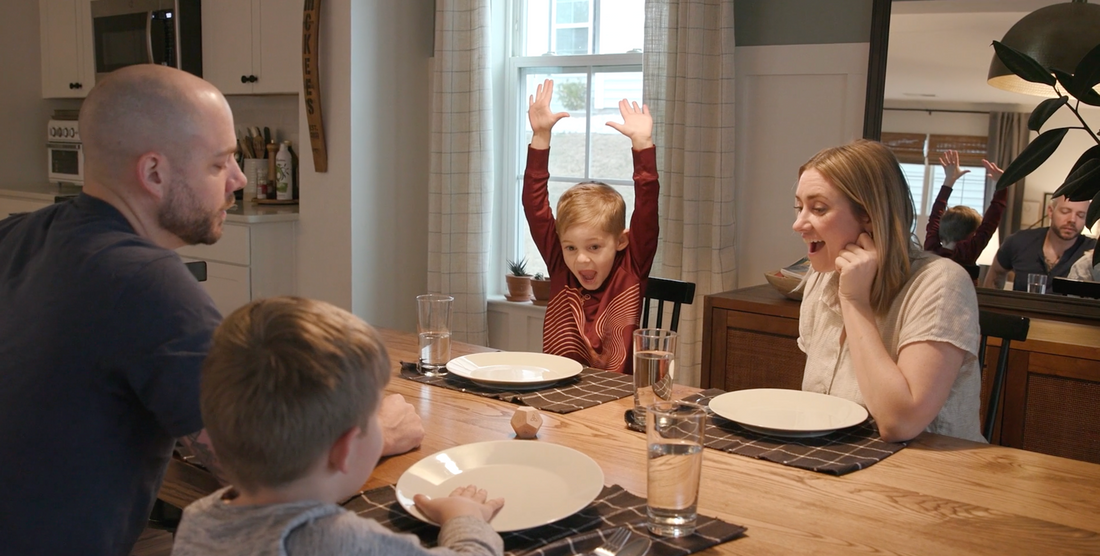Recently, on The GoodKind Podcast, we explored a powerful but often overlooked truth: your spiritual life is shaped not by big moments alone but by the small, daily habits you form over time.
These spiritual habits—simple, repeated practices—can shape your heart, your home, and your relationship with God in lasting ways. But are spiritual habits supposed to feel easy? And if they do feel easy, does that make them shallow? In this honest conversation between Clayton Greene, Amy Kavanaugh, and Chris Pappalardo, we uncovered what makes spiritual habits not only doable but truly transformative. Check out the episode, Easy Is Not The Same As Shallow, to hear the full conversation!

Why We Talk About Spiritual Life as Habit
Habits aren't just chores or duties—things like brushing your teeth or folding laundry. In fact, they’re the invisible rhythms that shape who we become. We brush without thinking because the habit is ingrained.
What if prayer, Scripture, and rest were that natural too?
Spiritual habits, when repeated consistently, start to feel like part of us—not a performance, but a pattern that makes knowing God easier and more natural. "The more you pray, the more you think about prayer. The more you think about prayer, the more you see the world through prayer."
What’s the Goal of a Spiritual Habit?
The goal isn’t perfection—or even performance. As Chris shared, the ultimate aim of spiritual habits is communion with God: to know Him, to enjoy His presence, and to be formed into Christlikeness over time.
Because knowing God is relational, not mechanical, your spiritual habits should draw you into relationship, not mere accomplishment. And because relationship is personal, the habits that shape you will vary by season and temperament.
Not every spiritual habit fits every person at every time. That’s why grace matters.
Is There a Keystone Spiritual Habit?
In habit-forming books like Atomic Habits, there’s talk of a "keystone habit"—the one practice that makes other habits easier. What is that for the Christian life? Clayton, Amy, and Chris each weighed in.
Good prayer—honest, two-way communication with God—is both a beginning and an end. It centers relationship and invites the Spirit’s work. The Bible introduces you to God’s character, trains your prayers, and reveals His story. Scripture reading forms the foundation for everything else. But they agreed: no universal keystone fits everyone.
Your season, your need, your wiring may make one habit more catalytic than another. "What is the one small step I can take right now to draw closer to God?" may be the better question than "What’s the best habit for all time?"

Why Making Spiritual Habits Easy Isn’t Shallow
Here's a truth that you might need to hear, especially if you've been a Christian a long time: Easy isn’t the same as shallow.
A child’s simple prayer can touch heaven. And the beauty and depth of Scripture can be grasped in the most rudimentary explanation of the gospel. Just because something is simple doesn't mean it's not complex, deep, and powerful.
"Easy" habits create on-ramps—short diving boards into the same deep pool of God's presence. The goal isn’t to dumb down faith but to make the first step achievable—so that it can lead to consistency, which leads to depth. Like climbing a ladder with many small rungs instead of impossibly spaced ones.
What to Do When Habits Feel Overwhelming
Trying to start all the spiritual habits at once is like going to the gym and using every machine in one day. Exhausting—and unsustainable.
Chris compared it to focusing on just cardio or arms for a time. Spiritual formation works the same way. Start small.
- Commit to one minute of prayer.
- Read a single Psalm.
- Light a candle and say thank you.
- Post one Sticky Prayer (available in the GoodKind Shop).
These are short diving boards—not shallow water.
The Danger of Depth Without Relationship
Clayton raised an honest fear: can focusing on "deep" things lead us toward spiritual pride or Pharisee-like self-reliance? After all, Jesus critiqued those who knew much—but forgot love, mercy, and accessibility.
True depth welcomes others in. It remains humble. Even knowledgeable disciples like Nicodemus learned slowly and relationally. Depth without love, without relationship, misses the goal.
Practical Takeaways for Your Spiritual Habits
- Start small: Choose one habit that fits your season.
- Aim for relationship: Habits are a means to know God, not impress Him.
- Stay consistent: Easy habits build a foundation for deeper growth.
- Be patient: Habits—and people—grow slowly but surely.
- Use tools wisely: Set cues for yourself as reminders to engage with God. (Sticky Prayers or GratiKube from goodkind.shop are a great way to start!)
Take a small step today. And if you miss it, there's grace to try again tomorrow.

